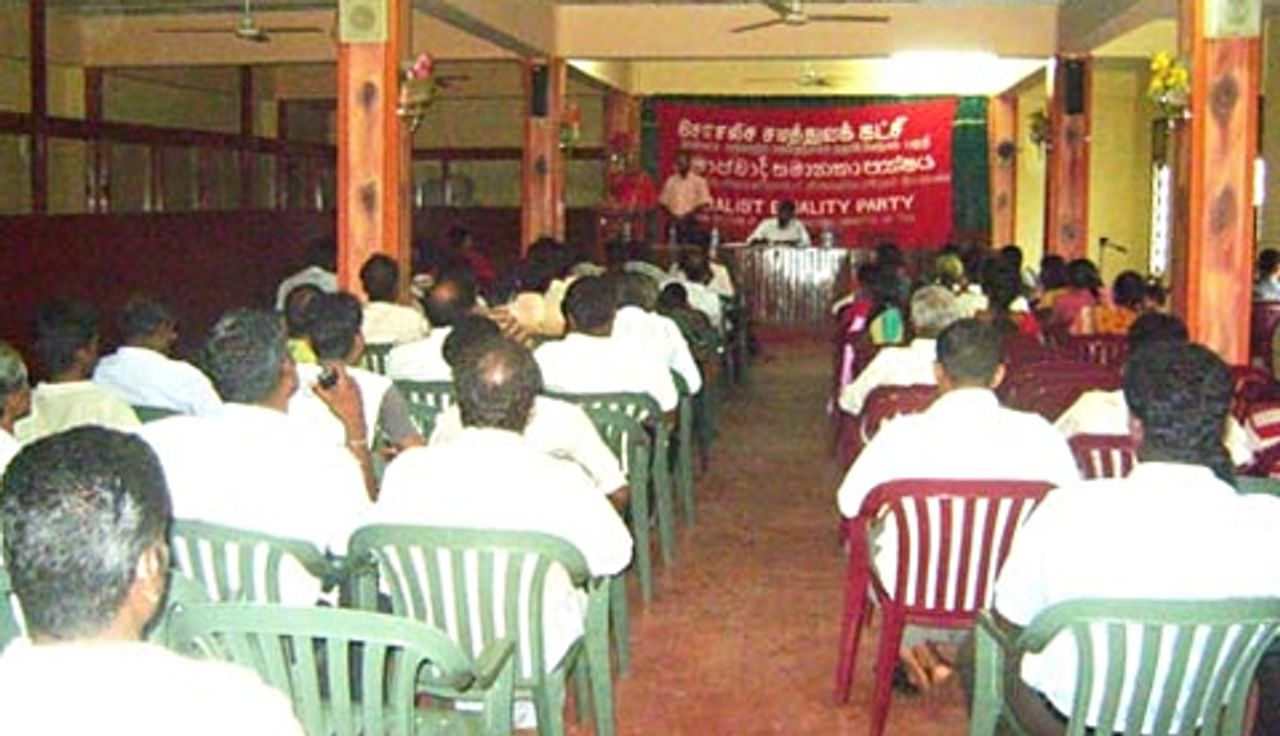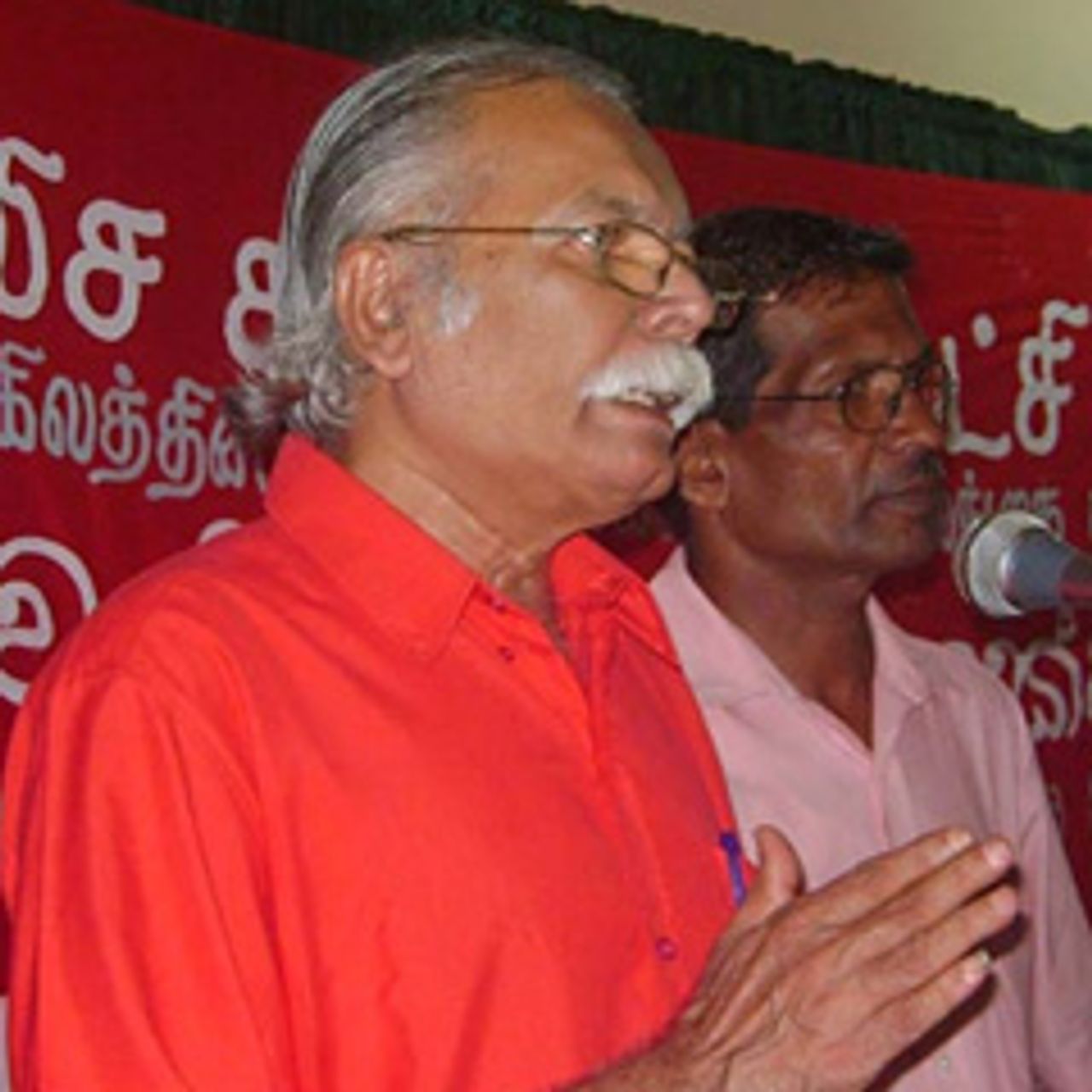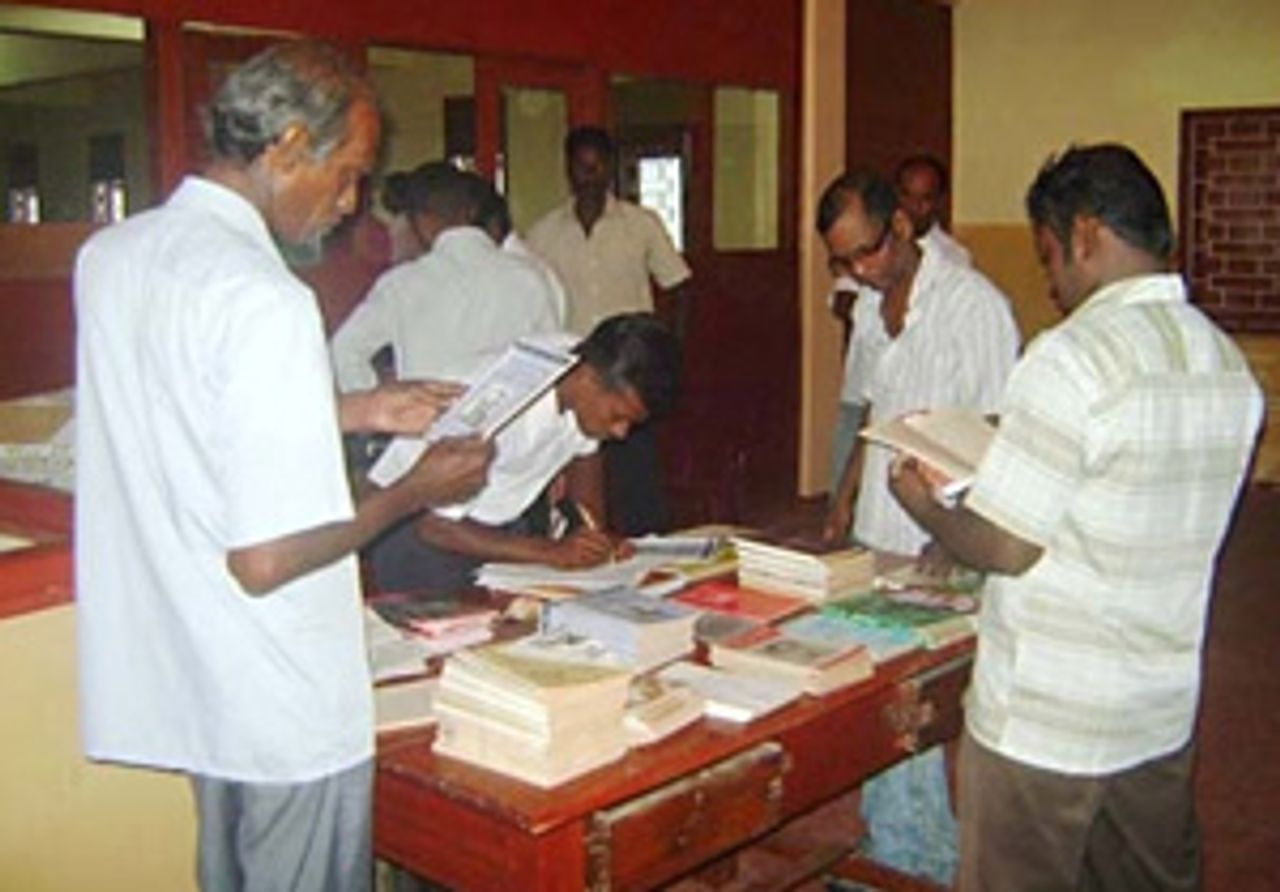The Socialist Equality Party (SEP) and the International Students for Social Equality (ISSE) in Sri Lanka held a well-attended meeting in the northern town of Jaffna on September 26 to mark the seventieth anniversary of the assassination of Leon Trotsky. About 90 students, workers, fishermen, farmers and housewives attended. Some spent hours travelling from towns such as Vavuniya, Kilinochchi and Point Pedro.
 A section of the Jaffna meeting
A section of the Jaffna meeting
The SEP campaigned for the meeting in a number of areas of the Jaffna peninsula and nearby islands, including Jaffna town, Kayts, Nelliady, Karainagar and Chunnagam, as well as at Jaffna University and other educational institutions. The whole Northern Province, which was ravaged by a quarter century of civil war, is still under heavy military occupation despite the defeat of the separatist Liberation Tigers of Tamil Eelam (LTTE) in May 2009.
SEP campaigners faced repeated harassment by security forces. On several occasions, teams were forced to go to police stations and were held for hours. They were released only after their personal details, including names, addresses and identity card numbers, were recorded. These conditions expose the government’s lie that it “liberated” the people of the North and East of the island.
P. Sambandan, a longstanding SEP member, chaired the meeting. He began by calling for two minutes’ silence in remembrance of Piyaseeli Wijegunasingha, an SEP member and widely known proponent of Marxist literary criticism, who died recently.
In his introductory remarks, Sambandan said: “Trotsky fought for the strategy of world socialist revolution. This strategy, vindicated historically, is the only way forward for the international working class today amid a deepening world capitalist crisis. Trotsky said the eruption of World War I in 1914 marked the death knell of nationalist programs for all the time.”
Sambandan explained that organisations such as the Palestine Liberation Organisation, the African National Congress in South Africa, and the LTTE in Sri Lanka had long ago given up their anti-imperialist pretensions. The LTTE’s defeat, he said, was a product of the communal program for which it fought.
“The LTTE did not call for the support of Sinhala-speaking workers or the international working class against the repression of successive Colombo governments. It sought the support of imperialist powers. As Trotsky explained, the national bourgeoisie in backward countries are hostile to the democratic rights of the people because of their capitalist interests. Only the working class, by taking the leadership of farmers, can solve the democratic problems as part of a socialist revolution.”
 Wije Dias addressing meeting
Wije Dias addressing meetingSEP general secretary Wije Dias delivered the main lecture entitled, “The seventieth anniversary of the assassination of Leon Trotsky, the perspective of the Permanent Revolution and the political and social crisis in South Asia.”
Dias commenced by saying: “We, the SEP, are based on the perspective of international socialism elaborated by Leon Trotsky. He founded the Fourth International in 1938 to unite the international working class across the ethnic and national lines for the world socialist revolution.”
Trotsky was murdered by a Stalinist assassin 70 years ago in what was the political crime of the century. Having co-led the Russian revolution with Lenin, Trotsky established the Fourth International to continue the struggle for socialist internationalism that had been betrayed by Stalin and his henchmen.
Dias said Trotsky and the program for which he fought had a particular relevance today in the midst of the deepening crisis of capitalism. That was why, he explained, various academics had recently written to try to belittle and denigrate Trotsky, particularly for a new generation of young people. “If Trotsky was so insignificant why are they going to such great pains in writing books and articles?” Dias asked. He encouraged the audience to read David North’s In Defense of Trotskyism, which refuted the lies, falsifications and slanders against Trotsky.
Outlining the international situation, Dias said: “Since September 2008, the whole capitalist system has increasingly been engulfed in a worsening economic crisis. Giant banks and financial institutions in the US and internationally, including some with long histories, collapsed. Governments spent trillions of dollars to prop up the global financial system and are now imposing austerity measures on workers and the poor to pay for these bailouts. At the same time, the working class and the poor are coming into the streets in their millions around the world to fight against these measures.”
The speaker said that none of the so-called left parties or trade unions had any solution. “The unions have become a tool for the capitalist class. At the General Motors plant in Indianapolis in the US, the United Auto Workers union conspired with the owners to cut the wages of workers from $29 per hour to $14. Workers vehemently opposed the union and have begun a struggle that is continuing and winning support from workers worldwide. We have to have an international socialist strategy to fight global capital.”
Dias emphasised that the implementation of austerity measures was incompatible with democratic rights. That was why every government around the world was turning to police-state methods. In Sri Lanka, the government of President Mahinda Rajapakse was an advanced expression of these moves toward autocratic rule.
Dias outlined Trotsky’s theory of permanent revolution, first elaborated in 1905. Trotsky explained that the bourgeoisies in countries of a belated capitalist development were organically incapable of carrying out the tasks of the democratic revolution. The democratic tasks would be carried out only by the working class, at the head of the peasantry, taking power as part of the struggle for socialism internationally. The theory of permanent revolution paved the way for the victory of the Russian Revolution in October 1917.
Dias quoted from Trotsky’s Open Letter to the Workers of India in 1939, which was based on the theory of permanent revolution. The letter explained that the working class should not rely on Mahatma Gandhi and the Indian national bourgeoisie but on its own revolutionary strength and its ability to lead the peasantry.
Dias briefly traced the struggle for Trotskyism in the Indian subcontinent, from the formation of the Bolshevik Leninist Party of India (BLPI) in 1942, as a section of the Fourth International, by a group of young Sri Lankan and Indian intellectuals inspired by Trotsky’s perspective.
In Sri Lanka, Dias explained, the Trotskyists had fought for the unity of Sinhala and Tamil workers in the struggle for a workers’ and peasants’ government. They had rejected the sham independence from British imperialism in 1948 and opposed the Citizenship Bill that deprived Tamil plantation workers of their basic rights. Sinhala and Tamil bourgeois parties passed the bill, disenfranchising one million plantation workers.
The BLPI fused with the Lanka Sama Samaja Party (LSSP) in 1950. Dias said that the political lessons of the LSSP’s degeneration held immense significance, not only for the working class in Sri Lanka, but throughout Asia and internationally. It was the LSSP’s betrayal of Trotskyist principles, when its leaders joined the bourgeois government of Madame Sirima Bandaranaike in 1964, that allowed the communal politics of the Sri Lankan bourgeoisie to predominate and ultimately led to the eruption of civil war in 1983.
“Today we are entering into an era of world revolution,” Dias said. He pointed to the developing class struggles in the imperialist countries, including America, Germany and Britain. In rapidly growing China and India, millions of people had been drawn into struggle. “These are indications of the coming mass struggles in Sri Lanka,” he added.
“What shall we do about Rajapakse’s repressive rule? The struggle against this government demands a party that is going to fight for socialism,” Dias said. As part of the fight for the world socialist revolution, the SEP advanced the slogan of a Socialist Republic of Sri Lanka and Eelam as part of the Union of Socialist Republics of South Asia and internationally. He called on the audience to join the SEP and take up this struggle.
 SEP literature table
SEP literature tableFollowing the lecture, there was a lively question and answer session. One audience member asked why Stalin had ordered the murder of Trotsky. In reply, Dias explained that as World War II erupted, Stalin regarded Trotsky as a great threat. Trotsky was the symbol of world socialist revolution. If socialist revolutions had been successful in one or two developed countries, Stalin would not have been be able to maintain his bureaucratic apparatus in Moscow. Stalin’s fate was tied to the defeat of the world revolution. Trotsky’s fate was tied to the victory of the world revolution.
The discussion continued after the meeting concluded. Many young people who took part in the meeting knew nothing of Trotsky and crowded around Dias to ask further questions. Others gathered around the literature table to buy Marxist literature and speak to SEP members.
Shanthan told the WSWS: “When I was studying, I came to know about Marxism and Leninism but I only found out about Trotskyism today. I understand from this meeting that the problems facing Tamil people will not be solved based on a nationalist program.” In the final stages of the 1983-2009 civil war, he said, while the Sri Lankan armed forces killed people, the LTTE was also not interested in the fate of ordinary people.
An electrician said: “I heard about Trotsky for first time today. I understand from this meeting why the LTTE was defeated, and why other Tamil organisations collaborate with the government. I also came to know the socialist program. I am ready to join the SEP.”
